| About
Sabahar
Sabahar is a secular, not-for-profit-only business founded to help
vulnerable Ethiopians escape from chronic poverty. They are a start-up
venture, still small and with lots to learn; however they have already
done a fabulous job creating jobs and new markets that would otherwise
be unavailable.
Women are employed in spinning cotton and silk, weaving textiles
from these materials and dyeing the textiles with locally grown
vegetable-based dyes. Most women are experienced with these arts;
however where needed, the women are taught new or enhanced skills.
Sabahar works with local NGOs in rural communities around Addis
Ababa, Ethiopia’s capital, and donates a portion of all sales
back to these non-profit NGOs, supporting women in a region still
recovering from decades of war, famine and drought.
| The Sabahar textiles sold
by The Peace Company are made by vulnerable women involved
in Sabahar’s development programs. As part of The
Peace Company’s Peace Gifts for Global Healing program,
a portion of profits from your purchase of Sabahar textiles
will be returned to the NGOs that Sabahar works with. |
|
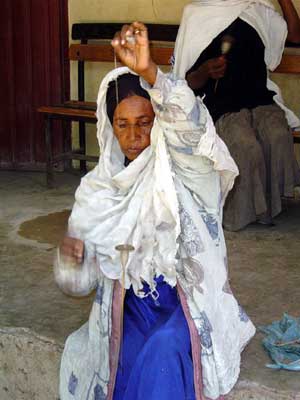 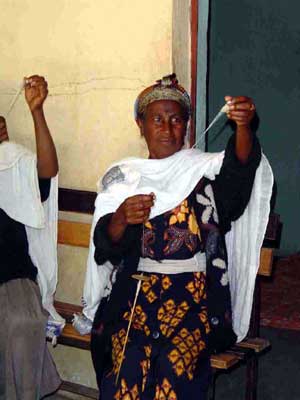
These are women from Alem Gena, a community 20 km from Addis
Ababa. These women belong to a group of 20 women who were selected
by the local authorities to participate in some focused, income
generating activities by a women's NGO. They were selected due to
their extreme vulnerability and poverty.
Tseganesh (right) is head of her household, and
supports two daughters. She is trying to earn enough income so her
daughters can complete their schooling. Her main source of income
before working with Sabahar was collecting firewood and selling
it locally in the market. This work is very difficult, unreliable
and can be risky for women. She is now spinning silk on a part time
basis (and she is an excelling spinner due to a lifetime of experience
spinning cotton). With the income she earns from Sabahar, she does
not have to go to collect firewood. Her daughters have also started
spinning silk, resulting in a substantial increase in reliable income
for the family.
Tseganesh will soon start a volunteer 'savings' program which Sabahar
is offering to such artisans, where a small percentage of weekly
income will be held by Sabahar in a savings account, and will be
augmented with an additional 'incentive' amount from the company.
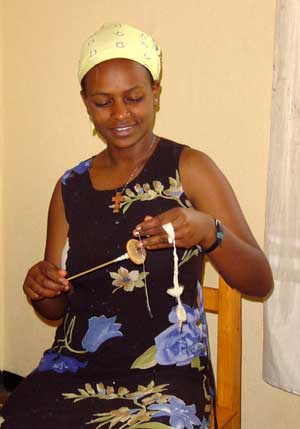
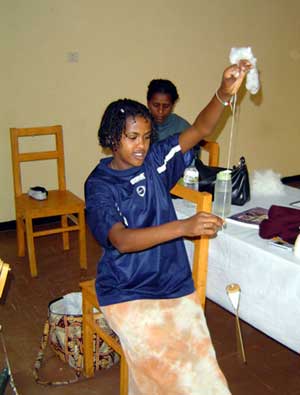
These young women are Fana (left) and Tshai
(right). They are part of the Youth with a Mission program. Sabahar
is trying to work with young women who have limited education and
extremely limited economic opportunities. They are often forced
into occupations which are dangerous and unreliable. Sabahar is
trying to introduce different technologies to such groups, in order
that they can earn some income which may then allow them to return
to school. Spinning is a skill known to most Ethiopian women and
does not carry with it low status as other handicrafts do.
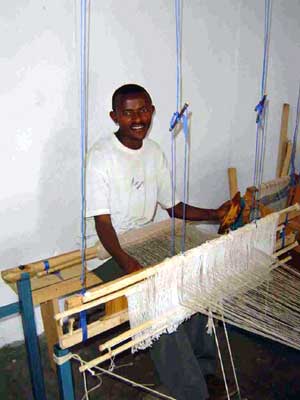
Setegn is a weaver who comes from
a traditional Dorse weaving family. He is one of seven siblings
who have learned to weave from their father. Setegn has worked with
Sabahar for more than a year now, and has developed unique and creative
techniques to work with the eri silk. He works on a traditional
loom using local techniques and designs. He is a master weaver,
and is willing to be a trainer for new weavers.
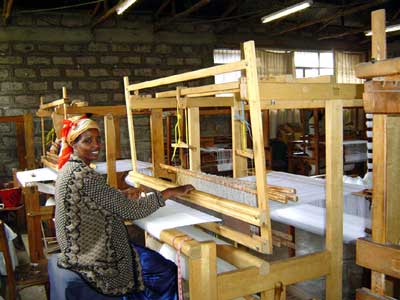
Emebet, is an employee of CBCIDO,
a community based organization founded by an extremely dedicated
and visionary Ethiopian woman, Dr. Jember, to be a model for a sustainable
community organization. All employees of the organization are chosen
on the basis of their willingness to work hard and their degree
of vulnerability. Most of the women weavers are sole supporters
of their children and had no previous employment or skills. Emebet,
as are the other seven women weavers, are paid according to the
work they do. They welcome orders from Sabahar, as this greatly
increases their reliable income.
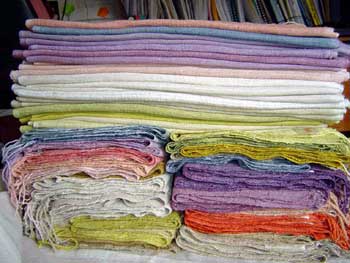
The final product - beautiful, natural textiles that are sowing
the seeds of peace in Ethiopia.
Sabahar has recently started working with Ethiopian prisoners.
The relationship between poverty, crime and conflict is clear—chronic
poverty and lack of economic opportunities fosters the seeds of
conflict and crime. The enormity of poverty in the developing world
exacerbates the potential for crime and conflict.
Sabahar is currently working with male prisoners who already know
how to weave. They are also just starting to train young women prisoners
to weave, which is a new skill for them. The weaving skills will
help ensure they can find work once they are released. Once back
in society, both men and women may continue to weave for Sabahar,
providing ongoing income and an incentive to not return to prison.
The income the prisoners earn while incarcerated will be available
to them when are freed.
For more information about human rights issues in Ethiopia, please
visit the Human Rights Watch website.
|